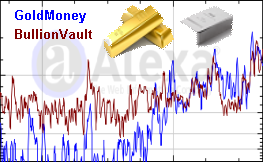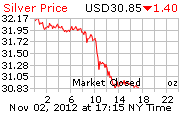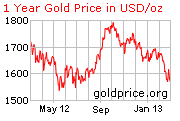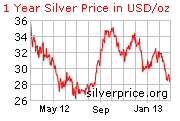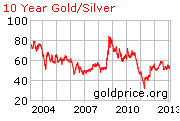The Gold Standard Goes Mainstream
By Seth Lipsky | WSJ
-
An under-reported development of this campaign season is the Republican Party’s decision this week to send Gov. Mitt Romney into the presidential race on a platform effectively calling for a new gold commission. The realization that America’s system of fiat money is part of its economic problem is moving from the fringes of political discussion to the center.
This is a sharp contrast from the last time a gold commission was convened, in 1981, a decade after President Nixon abandoned the Bretton Woods system and opened the era of a fiat dollar. The 1981 commission recommended against restoring a gold basis to the dollar. But two members, Congressman Ron Paul and businessman-scholar Lewis Lehrman dissented and outlined the case for gold.
The new platform doesn’t use the word “gold,” describing the 1981 United States Gold Commission as looking at a “metallic basis” for the dollar. But the metal was gold, and the new platform calls for a similar commission to investigate ways “to set a fixed value for the dollar.”
What has stayed with me from 198 1when I covered the commission as a young editorial writer for this newspaper is how momentum for a new gold standard faded amid the successes of the supply-side revolution. President Reagan pushed through his tax reductions and Federal Reserve Chairman Paul Volcker maintained tight money. Inflation was defeated. The value of the dollar, which had sunk below 1/800th of an ounce of gold during President Carter’s last year in office, soared.
The 1981 commission was also stacked against a gold-backed dollar from the start. The ruling philosophy was monetarism which, as propounded by Milton Friedman, seeks to keep prices steady by adjusting the money supply. The commission’s executive director was Anna Schwartz, co-author of Friedman’s “Monetary History of the United States,” and the Democratic-controlled House held firm to monetarist orthodoxy.
Today things have changed. Both Friedman and Schwartz died as heroes of capitalism and freedom, but monetarism lacks the sway it once had. Even Friedman before he died seemed to adjust his thinking on using the quantity of money as a target. Schwartz predicted that monetary instability would be a breeding ground for a restoration for the role of gold.
In the ferment within today’s Republican Party, the gold standard has become almost the centrist position. On the left would be those who favor a system of discretionary activism in which brilliant technocrats, such as Ben Bernanke at the Fed, use their judgment in setting interest rates. A bit to their right would be advocates of a rule, such as John Taylor’s rule linking interest rates to various conditions, or one that requires the Fed to target the price of gold but stops short of defining the dollar in terms of specie.
In the center would be advocates of a classical gold standard, in which a dollar is defined as a fixed amount of gold. These include, among others, Mr. Lehrman, James Grant of Grant’s Interest Rate Observer, publisher Steve Forbes, economist Judy Shelton, and Sean Fieler of the American Principles Project.
A bit further to the right would be partisans of the Austrian school of economics, including Rep. Paul. He advocates less for a gold standard than for an idea of Friedrich Hayek, the Nobel laureate who came to favor what he called the denationalization of money and a system centered on private coinage and currency that would compete with government-issued money. Further right are purists such as the radical constitutionalist Edwin Vieira Jr., who would simply price things in weights of gold or silver.
A good bit of overlap exists among the camps, but Congress has come alive to all points on this spectrum. Rep. Kevin Brady, a Texas Republican who is vice chairman of the Joint Economic Committee, is seeking to pass the Sound Dollar Act, which would end the Fed’s mandate to keep unemployment down, instead having the central bank focus only on stable prices. Rep. Paul is pressing the Free Competition in Currency Act, which would end legal tender and put Hayek’s ideas into practice.
In the Senate, Jim DeMint, Mike Lee and Rand Paul are offering the Sound Money Promotion Act, which would remove the tax on the appreciation in the value of gold and silver coins that have been declared legal tender by the federal or a state government. Utah has already made gold and silver coins legal tender in the state.
Then there is Mr. Romney. In Paul Ryan he chose a running mate who understands the idea of sound money. In June 2010, as chairman of the House Budget Committee, Mr. Ryan asked Mr. Bernanke what he made of record-high prices of gold. (The value of the dollar had just slid to below 1/1,200th of an ounce of gold; it has since plunged to below 1/1,600th of an ounce.)
“I don’t fully understand the movements in the gold price,” Mr. Bernanke replied. He confessed his belief that some people were hedging “against the fact that they view many other investments as being risky and hard to predict at this point.” No wonder the eventual House bill to audit the Fed passed with overwhelming bipartisan support.
This is the context in which Mr. Romney last week moved so pointedly to distance himself from a suggestion by one of his advisers, Glenn Hubbard, that Mr. Bernanke should be considered for another term. Mr. Romney made clear that he would be looking for a new Fed chairman, an important signal from a candidate who has made some mistakes such as suggesting that monetary policy should be kept away from Congress. In fact, it is precisely to Congress that the Constitution (in Article 1, Section 8) grants the power to coin money and regulate the value thereof.
The New York Sun, the online paper I edit, has warned that a gold commission could prove to be the graveyard for sound money on the principle that if one wants to bury an idea, one need but name a commission. But it’s possible that a well-conceived and well-staffed gold commission could actually sort out the debate.
It’s no small thing that Mr. Romney’s platform calls for a gold commission and an audit of the Fed. The last Republican to run on a platform calling for a dollar “on a fully convertible gold basis” was Dwight Eisenhower, who cast the promise aside once in office. That’s a strategic misstep for Mr. Romney, should he win in November, to avoid.
—-
Mr. Lipsky is editor of the New York Sun. The recipient in April of a grant in the form of a lifetime achievement award from the Lehrman Institute, he is writing a book on the constitutional dollar, forthcoming from Basic Books.
-
Related Articles:
The Aerographite Dollar: Returning the Fed to its golden roots
-
August 31, 2012 at 4:51 AM | #1The Gold Standard Goes Mainstream « Gold Rush Tour 2009
-
August 31, 2012 at 8:59 AM | #2Infowars Wexford | The Gold Standard Goes Mainstream

